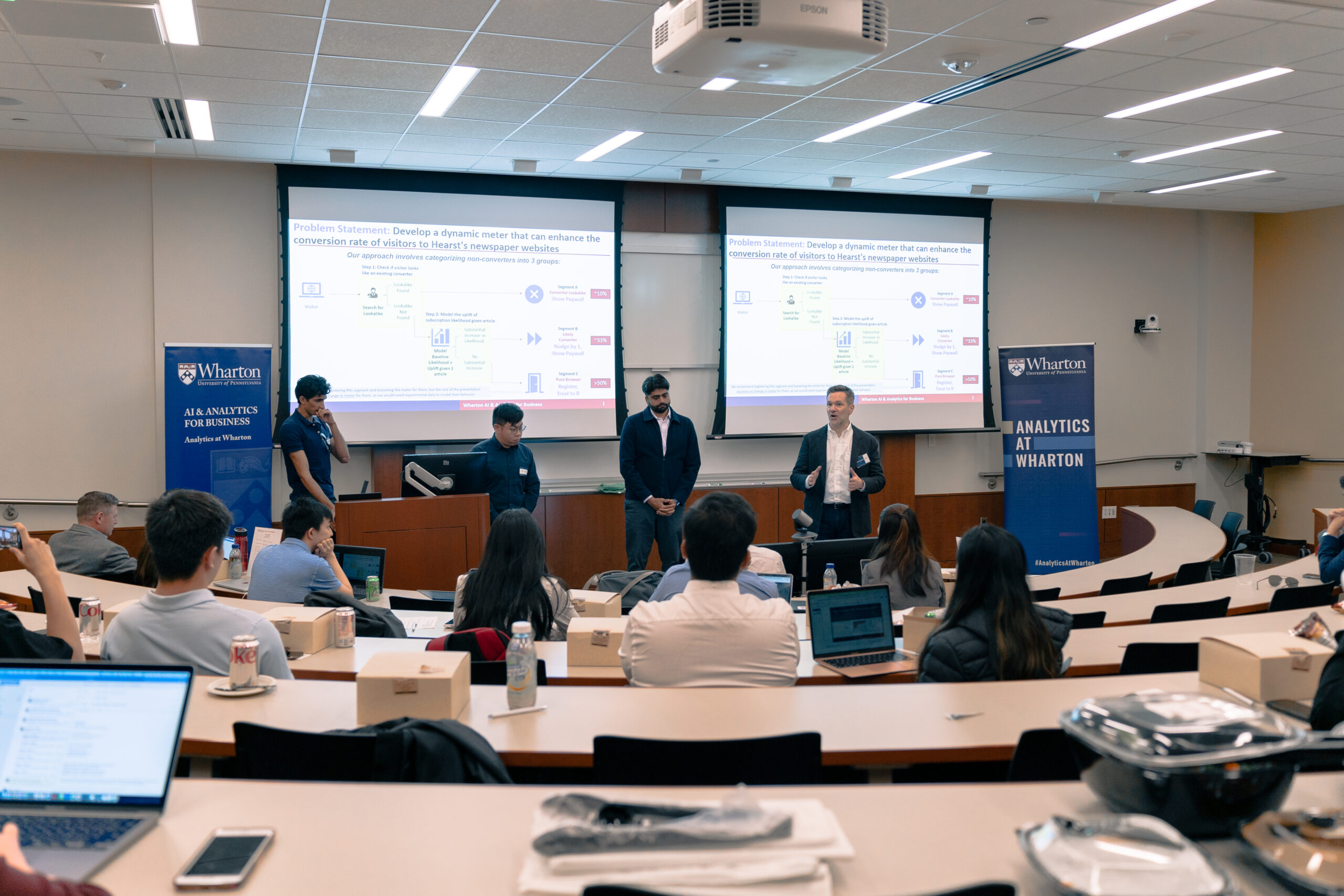Analytics at Wharton
News
A Day in the Life of a Student in the Spring 2023 Analytics Accelerator
Rishabh Mandayam, M&T, ’24, may only be a sophomore, but he already has experience demystifying messy real-world datasets and making recommendations for name-brand companies around the world.
For the past three semesters, Mandayam has been collaborating with Analytics at Wharton’s corporate partners on the Analytics Accelerator, a six-week project where students wrangle company data and provide actionable business solutions. This spring marked the 10th Analytics Accelerator and saw Mandayam’s student team working alongside Hearst to uncover insights about the company’s readers. Their goal was to find optimal strategies for converting those readers into paying subscribers.
Mandayam, who studies computer science, finance, and statistics in a dual-degree program with Engineering and Wharton, learned about the Analytics Accelerator through his professor and faculty co-director of Wharton AI & Analytics for Business, Raghu Iyengar, during his freshman fall.

Having first applied for the Analytics Accelerator in the spring of 2022, Mandayam has quickly navigated the program’s ranks. He now serves as the vice president of projects for Wharton Analytics Fellows, the student group helping to facilitate each Analytics Accelerator. The view may be different from the other side of the application process, but the passion remains the same.
“We want to see students who are not only the most technically skilled, but who are really passionate about learning more when it comes to applying data science for a real-world application,” he says. “The [Analytics Accelerator] application is decently long – you have to go through a couple of processes – so everyone who ends up making it is very passionate about what they’re doing. You’re going to be on a team with people who have different experiences than you, but they all care a lot about making this project successful.”
Often, that passion extends into the night, with teams piling into group study rooms at Huntsman Hall, and covering all available surfaces with ideas, equations, and lines of code. It’s during these meetings, which for the Hearst team occur on Mondays at 7 or 8 p.m., that they share ideas they brainstormed over the weekend and begin coding their latest interpretation of Hearst’s data. They then spend the next few days refining their findings, and more importantly, their presentations, ahead of their weekly check-in with Hearst’s own data science team.

“You’re just trying to create something using your own personal experiences and creativity. You know it’s going to make an impact.”
– Rishabh Mandayam, M&T, ’24, Analytics Accelerator Student
Mandayam estimates the Analytics Accelerator occupies 8-to-10 hours of his week, but that it rarely feels like work. “You’re just trying to create something using your own personal experiences and creativity. You know it’s going to make an impact. If I had to choose between memorizing another type of model or learning another math equation versus trying to build out a real machine learning model on some serious data that’s live, and no one else in the world has touched except for you, I’d definitely choose the latter.”
It’s a process that requires a fundamental shift in how the students think about data and models, says Mandayam. “A vice president of a company, they don’t really care whether or not you used a logistic regression or the technical details of a random forest model. It’s not like you’re presenting to a professor in a classroom setting where you’re looking for the most accurate or most robust model…it’s not running on any server that’s auto-grading [your work]. You need something explainable that a CEO or a VP can take back to his own company and his team and say, ‘this is what the students at Wharton have showed us and this is what we should change within our company to do this.’”

“Not only did the student team deliver on data acumen, they also exceeded my expectations on being able to present the information in a way that a lay person could understand.”
– Marc Campbell, Chief Marketing Officer, Hearst Newspapers
Mandayam knows perfectly well that this is the type of real-world experience that will serve him and other members of the Analytics Accelerator greatly in just a few short years when they enter the professional world. “I was talking to someone who’s currently at Blackstone in data science,” he says. “He’s also a Penn graduate, and he actually did [the Analytics Accelerator] a few years ago. He said those skills he picked up straight from the Accelerator, he applies every single day when he goes to work at Blackstone.”
According to Marc Campbell, chief marketing officer for Hearst Newspapers, Mandayam and his teammates are more than prepared to find success at the next level. “Not only did the student team deliver on data acumen, they also exceeded my expectations on being able to present the information in a way that a lay person could understand,” he says. “We could have gone to an outside consultant to help us with this data science challenge, but what the student team brought to the table was an enthusiasm and perspective that brought fresh eyes to an old problem.”
About the Analytics Accelerator
Every fall and spring semester, Analytics at Wharton hosts the Analytics Accelerator, an experiential learning program that pairs students with a company to solve a real-world business problem using the company’s actual datasets and the latest techniques including machine learning and AI.


